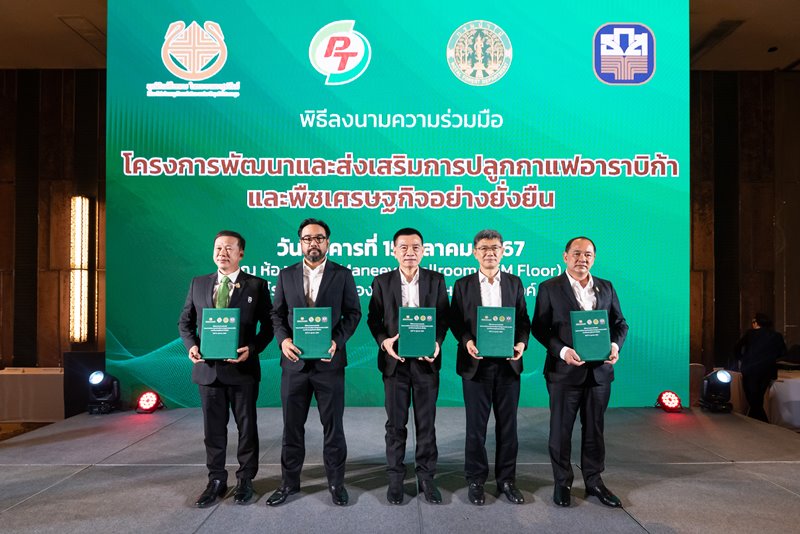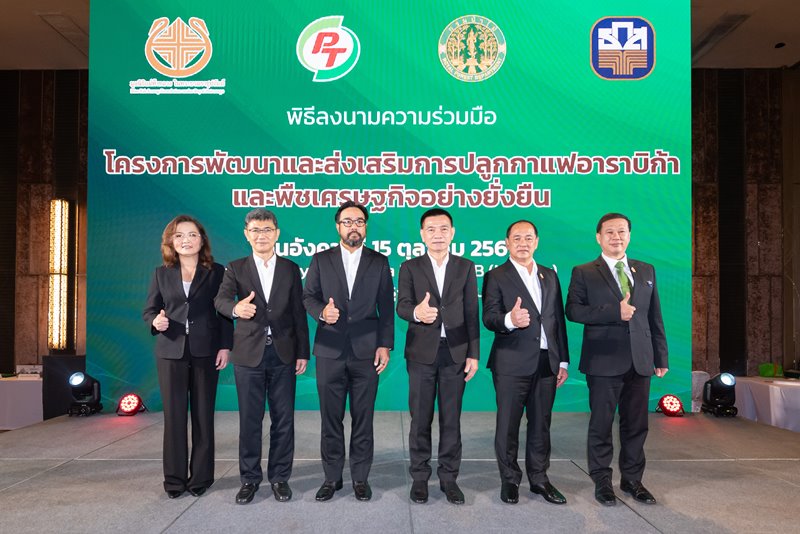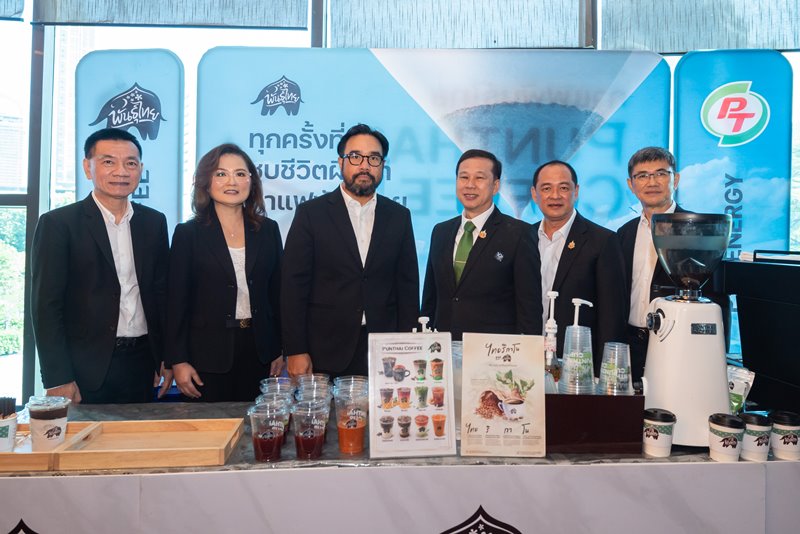IR Press Releases
PTG Joins Forces with Mae Fah Luang Foundation, Royal Forest Department, and BAAC In Support of Growing Arabica Coffee and Sustainable Economic Crops for Agriculturists’ Well-Being – Directly

PTG Energy PCL (PTG) has signed a memorandum of collaboration with the Mae Fah Luang Foundation under Royal Patronage, the Royal Forest Department, and the Bank for Agriculture and Agricultural Cooperatives (BAAC). The objective of this collaboration is to promote the sustainable development of Arabica coffee and other economic crops in environmentally suitable areas across Thailand, thereby creating opportunities and improving the livelihoods of coffee farmers. The Arabica coffee beans will be directly supplied to Punthai Coffee.
Mr. Pitak Ratchakitprakarn, Chief Executive Officer and President of PTG Energy PCL (PTG), revealed that the collaboration with the Mae Fah Luang Foundation under Royal Patronage, the Royal Forest Department, and BAAC aims to develop forest areas sustainably by supporting the cultivation of Arabica coffee beans and other economic crops. This initiative also aims to preserve natural forests and expand forest areas, enhancing their fertility. The project seeks to generate income and improve the quality of life for farmers.
More importantly, high-quality Arabica coffee beans, which meet market demand and standards, will be supplied to PTG and Punthai Coffee Co., Ltd. (a subsidiary of PTG). Arabica coffee beans and other economic crops will be purchased from farmers in line with established quality, quantity, and pricing standards.
In signing the memorandum of collaboration, PTG’s role is to provide knowledge and support in coffee bean cultivation and processing, as well as other economic crops. PTG will purchase these crops at fair and sustainable prices, ensuring adherence to quality standards. Additionally, PTG offers support through innovative methods for crop purchasing, quality control, and value-added processes for coffee beans and economic crops. These efforts are designed to encourage the use of locally sourced raw materials and facilitate the development of products for internal sales. PTG will also support the marketing of these products, aligned with customer needs and competitive product pricing.
As part of the collaboration with the Royal Forest Department, PTG will provide financial support for sourcing and cultivating coffee beans and trees in areas allocated by the Royal Forest Department for a consecutive three-year period. The focus is on developing coffee seedlings and sharing knowledge on breeding and cultivating them effectively. This collaboration will also foster the participatory development of reforestation processes, improving both the economic and social well-being of communities while increasing forest coverage. PTG and the Royal Forest Department will also collaborate on monitoring and evaluating reforestation efforts, including assessments of social impacts, forest growth, and the ability of the forests to absorb greenhouse gases.
In cooperation with BAAC, PTG will offer marketing and public relations support, serving as a framework for production planning among community enterprises. PTG will also organize various activities to strengthen relationships with local communities (CSR) and disseminate knowledge about coffee and economic crop cultivation. PTG will provide seedlings for trees, coffee, and other crops suited to the environment.
Crucially, high-quality coffee beans that meet required standards will be supplied to Punthai Coffee Co., Ltd., which will purchase Arabica coffee beans and other economic crops from farmers at fair and appropriate prices.
M.L. Dispanadda Diskul, Chief Executive Officer and Secretary-General of the Mae Fah Luang Foundation under Royal Patronage, stated that since 1988, the foundation has been operating the Doi Tung Development Project in Chiang Rai province, following the Royal Initiative. This project aims to address issues related to illicit crop cultivation, poverty, and improving the quality of life in targeted communities by promoting alternative livelihoods, particularly through the cultivation of economic forests. The foundation also works with local entrepreneurs to improve the quality of life in these communities, while managing natural resources holistically. The foundation supports the cultivation and processing of coffee and other economic crops in suitable areas.
PTG emphasizes forest conservation, community development, and support for local farmers, with a policy to expand coffee and economic crop plantations in areas suitable for increasing forest and economic forest coverage, contributing to long-term sustainability. Another goal is to incorporate Thai indigenous ingredients into products sold at PTG-managed outlets, supporting sustainable agriculture.
Both parties have shared objectives and intentions to collaborate on the development of targeted areas through hybrid operations such as reforestation and the cultivation of coffee and other crops suited to each area. They also support the use of products derived from alternative sources and local communities, as well as the development of community products in targeted areas. As a result, both parties have signed this memorandum of collaboration.
Mr. Surachai Ajalaboon, Director General of the Royal Forest Department, stated that the department will support the ‘Creating Forests, Generating Income’ project by providing no less than 50,000 rai of land for forest cultivation and conservation. The Royal Forest Department will also offer relevant information and coordinate with PTG, organizations, communities, and other stakeholders to ensure the project’s effectiveness. Project officers and consultants will be available to assist in location sourcing and community coordination.
Mr. Narong Khantiviriyakul, Deputy Manager of BAAC, mentioned that BAAC’s role involves assessing the preparedness and potential of farmers and agricultural institutions to participate in the project. This includes evaluating financial readiness and providing appropriate sources of funding for the projects, in compliance with BAAC’s rules, regulations, and conditions. BAAC will also work to develop channels for marketing agricultural products produced by farmers and agricultural institutions, establishing connections with markets served by PTG.



